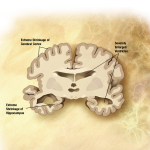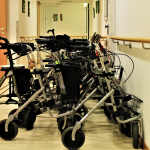A web of altered neurochemical pathways and physical brain changes result in post-traumatic stress disorder, or PTSD. The interplay between cortisol dysregulation, heightened norepinephrine levels, and structural alterations in key brain regions make some individuals more susceptible to PTSD than others.
dementia
A new study of associations between incident dementia and air pollution caught my attention because air pollution studies like this have been driving me toward dementia for decades. Let’s unpack their findings.
The drug, Leqembi, does not reverse symptoms. In patients in the early stages of Alzheimer's disease, it slowed cognitive and functional decline somewhat compared with placebo. The FDA’s approval of Leqembi is not the end of the Alzheimer’s journey, but it could be a way station.
Will taking cocoa or multivitamins slow the onset of dementia? A new study suggests at least one of these interventions may make a difference. COVID lockdowns quickly became a topic for partisan bickering, but did they actually work?
Could cocoa extract or a multivitamin slow the onset of dementia? A new randomized placebo-controlled study offers some hope. (Spoiler alert: Eating a chocolate bar a day will not keep dementia away.)
In episode 7 of the Science Dispatch Podcast, we review New York University's experiment to offer students free medical school, the goal being to push doctors into under-served communities and understaffed specialties. We then tackle a popular nutrition myth: the dementia-fighting benefits of blueberries.
Miracle foods that keep you "focused and sharp" as you age probably don't exist. Popular news reports claim otherwise, though they're based on flimsy evidence.
The CNBC headline. “A Harvard nutritionist and brain expert says she avoids these five foods that ‘weaken memory and focus.” She is also the author of “This Is Your Brain on Food,” an Amazon #1 bestseller in obsessive-compulsive disorders. I haven’t read the book, but it would be pointless based on her article, which appeared on many other news outlets.
Can avoiding certain foods reduce your dementia risk? One nutritional psychiatrist seems to think so, but the evidence is much messier than it looks at first glance.
One recent article in the bioethical literature bemoaned the expense of pursuing this noble career. Worse still, is that no one really knows what qualifies one to practice bioethics. But at $80,000 for advanced certification, it’s still a lot cheaper than a law or medical degree (although perhaps not quite as expensive as a degree in theology – which some claim might be more helpful).
Our elderly population living in nursing homes has been a target of COVID-19 and now early vaccination. Was COVID-19 preying upon the weak and frail -- where some co-morbidities more likely to be problematic -- or were nursing home protocols, and the staff administering them, one of the Horsemen of the Apocalypse?
At least 10% of the U.S. population is currently taking a statin to help lower cholesterol. But can statins help prevent dementia? More importantly, can these same statins accelerate dementia? And how can we explain how statins are responsible for such dramatically different responses? Let's take a look.











